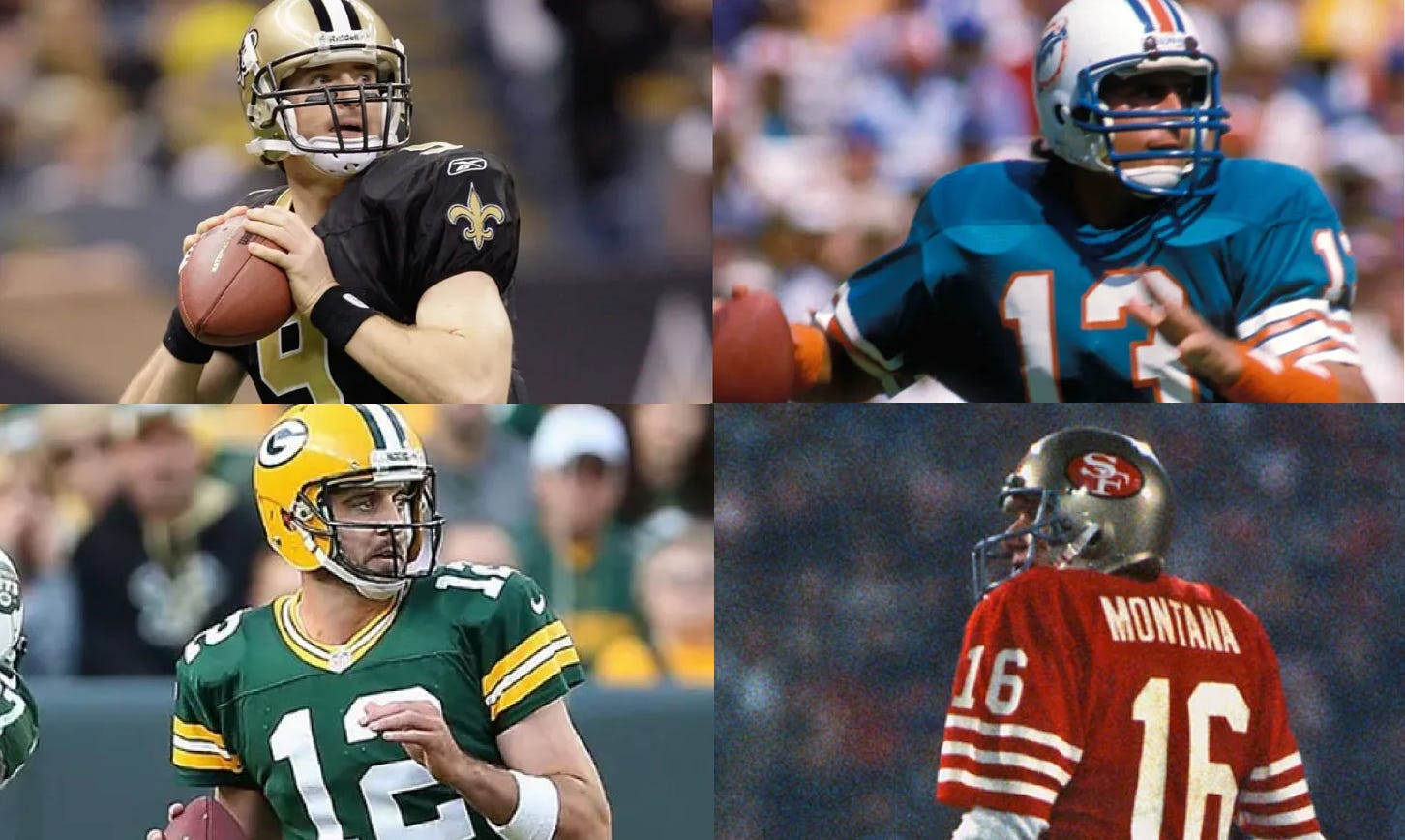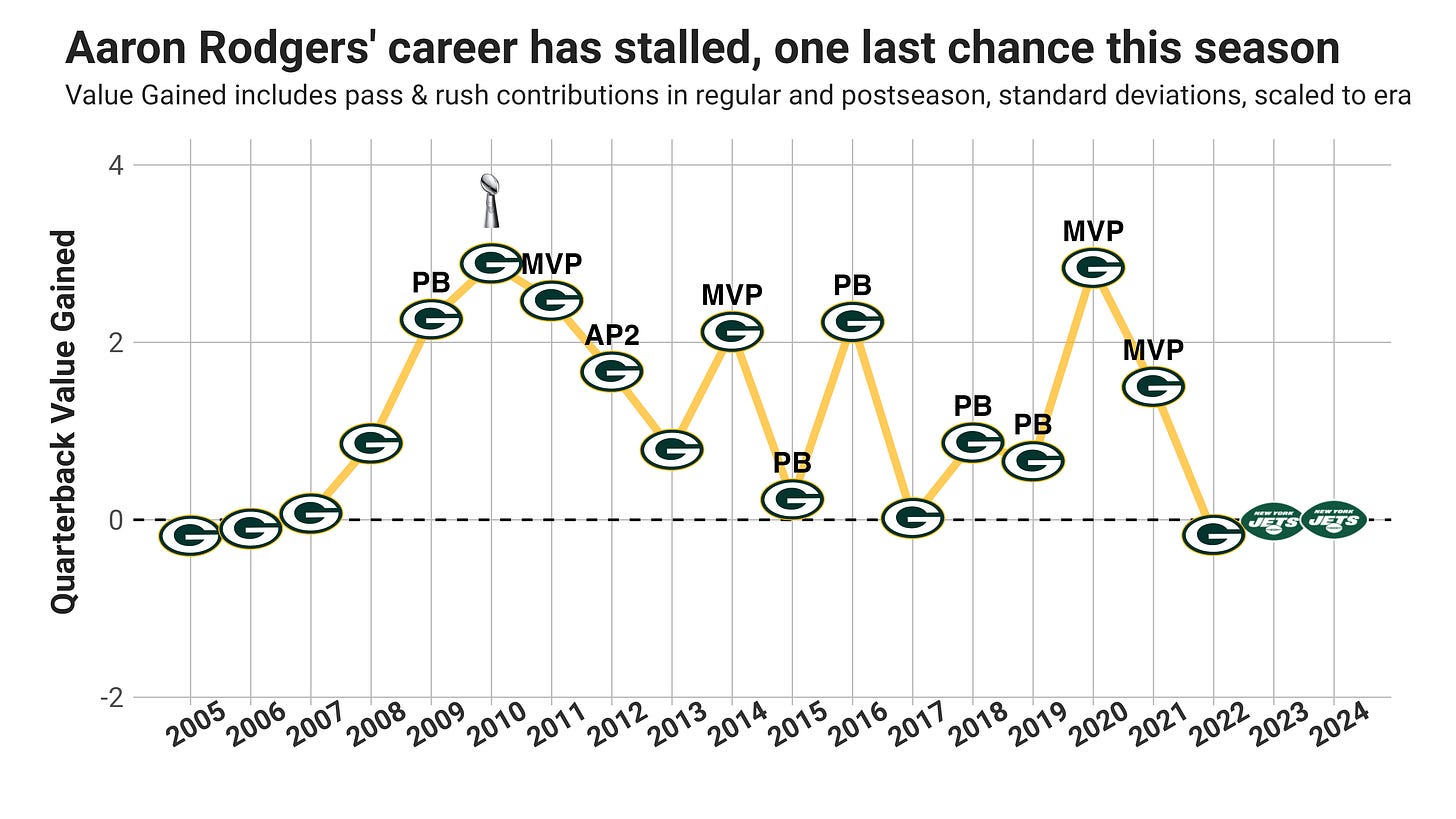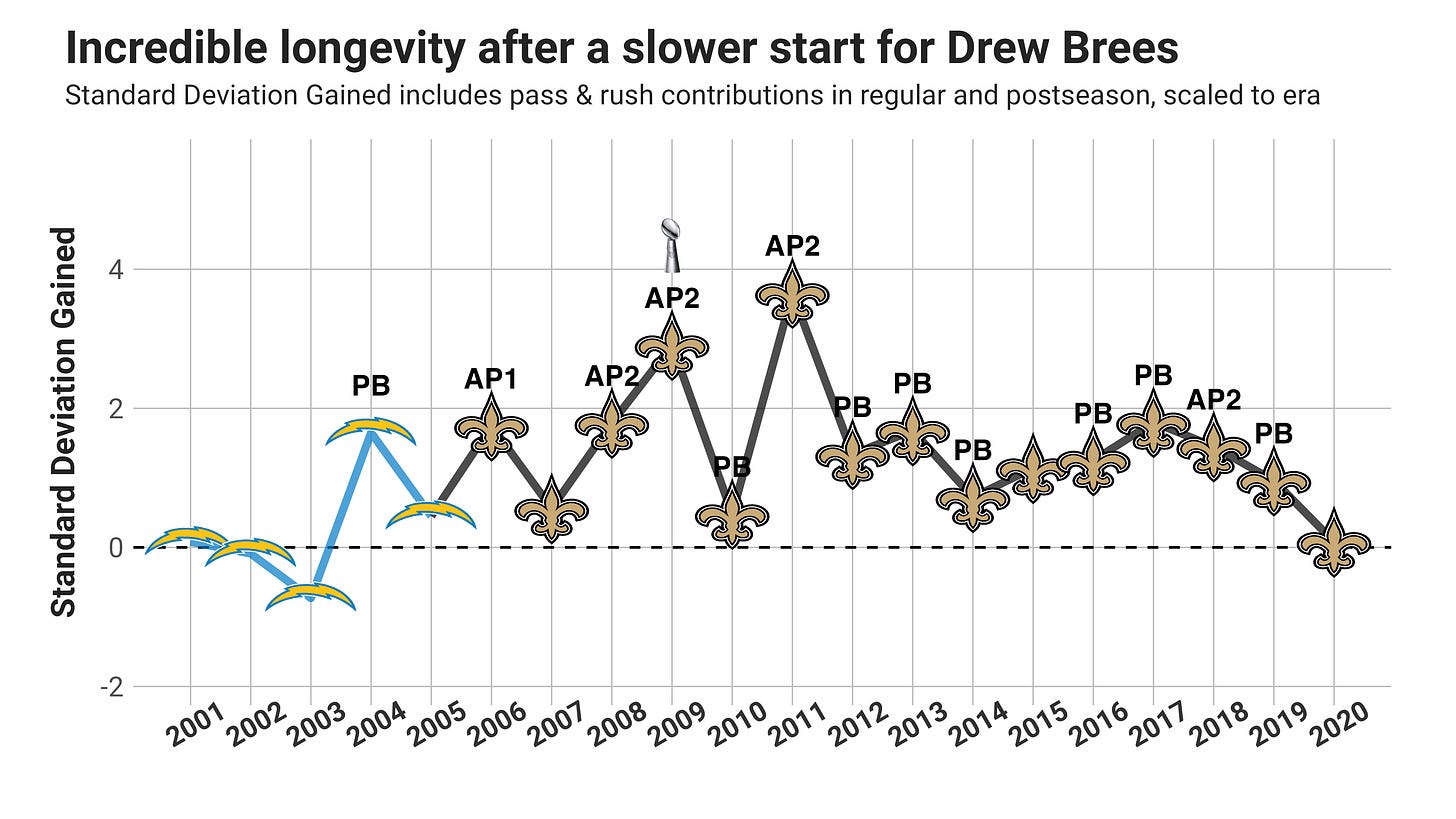The QB GOAT Series: 6-3
Rodgers sits right outside the top-5, Brees compiles value into the top-tier, with two 1980-90s legends right outside the top-2
I don’t agree 100% with all the rankings, but the beauty of stats-based analysis is that we can take representative data from nearly one million of quarterback dropbacks over nearly a century of the modern NFL to rank-order quarterbacks by value. Good luck watching, grading and comparing every quarterback snap from 1947 to 2024 and then forming your own film-watcher list.
On the career plots, you’ll see indications for Pro Bowl (PB), All-Pro Second-Team (AP2), All-Pro First-Team (AP1) and Most Valuable Player (MVP) regular seasons. I’ve also added an image of the Super Bowl trophy for championship seasons.
Without further ado, the 10th-7th most value quarterbacks in NFL history. For those who didn’t play the last two years, I’ll post the rankings and career-value graph, with a link to my previous post with my commentary on that quarterback.
Links to past posts:
No. 6: AARON RODGERS
Regular: 5th, Peak: 5th, Playoffs: 8th
Despite two full years passing with Aaron Rodgers still in the NFL and beginning both years as the starting quarterback, his QB GOAT ranking hasn’t moved at all. Rodgers barely played in 2023 after an opening-game injury, and his 2024 campaign was largely mediocre. That said, the perception of Rodgers last year was that he was struggling mightily, whereas his efficiency was roughly aligned with the league average. Rodgers wasn’t helping his team succeed, and the New York Jets had issues far beyond quarterback play to account for the team-level lack of success.
Can Rodgers still get into the top-5 and beyond? It’s certainly possible. By the QB GOAT methodology, Rodgers needs one more season (perhaps his final season) to surpass 0.9 standard deviations above average on the plot above to boost him into fifth place. He’d need a season at 1.6 standard deviations - a much greater ask - to get to fourth place. Going into the top-3 move necessitates multiple elite seasons, something all but certainly out of range of possibilities.
The important feeling, for me, looking back at Rodgers’ career is that of appreciation. Rodgers doesn’t do himself any favors with his resentment towards NFL media and politically divisive opinions, which provoke a backlash, deserved or not. Unfortunately, this backlash has often gone well beyond countering his personal opinions and metastasized into rooting for his failure, framing his play in a negative light and, most disappointingly, degrading just how great of a quarterback he really was.
Rodgers has the second most MVP awards and the highest quarterback rating in NFL history. While his career postseason W-L record is a lackluster 11-10, Rodgers has been very efficient in the postseason, boosting his QB GOAT playoff ranking to 8th overall, higher than the totals for all-time greats like John Elway, Peyton Manning, Steve Young, Brett Favre, Drew Brees and Dan Marino. Rodgers lost all overtime games he played in the postseason, with four other losses in games when his opponent scored at least 35 points. Rodgers could have done more down the stretch of those losses to win the games, but he wasn’t a playoff choker by any stretch.
My full commentary on Rodgers from two offseasons back can be found here.
Aaron Rodgers has become a polarizing figure for more reasons than one. Following the 2014 regular season, Rodgers was looking like a strong contender for greatest ever, with two MVPs seasons and a Super Bowl in seven years starting. Starting with a crushing loss in overtime to the Seattle Seahawks in the Conference Championship (the Packers were up 19-7 with the ball and less than five minutes remaining), Rodgers entered a dark period for efficiency. Rodgers only finished inside the top-10 in passing efficiency once in four seasons, after finishing in the top-3 for five straight years.
And the Packers couldn’t get back to the Super Bowl, losing in the Divisional round after the 2015 season, Conference Championship after the 2016 and 2019 seasons, and missing the playoffs altogether in 2017 (Rodgers out for most of the year) and 2018. A quarterback who once looked like the greatest ever didn’t look like he even belonged in the top-10.
In the 2020 and 2021 seasons, Rodgers had one of the most impressive revitalizations in NFL history, leading the NFL in passing efficiency both seasons, winning back-to-back MVPs, giving him four - the second most ever. Despite the return of dominant performances in the regular season, the Packers, again, disappointed in the playoffs. First, they suffered another agonizing loss to the eventual champion Bucs in the Conference Championship, and went down rather pathetically to the 49ers in the Divisional Round the next year.
No. 5: DREW BREES
Regular: 3rd, Peak: 9th, Playoffs: 21st
My full commentary on Brees from two offseasons back can be found here.
I’ll say right off the bat that this ranking is probably too high. Brees is going to get passed by Aaron Rodgers (No. 6) this season, and Patrick Mahomes (No. 11) is also, surprisingly, not that far away. Other big factors in Brees’ overvaluation are his advantages in weather and opponent defensive strength, or lack thereof.
Brees played half of his games at home in the dome, and also played in a division with another dome (Atlanta), and two year-round good weather locations (Tampa Bay and Charlotte). That’s 11 games locked in every year nearly always without weather issues, as many as any quarterback in the NFL - or tied with Matt Ryan (No. 28) for all those years. Brees’ NFC South opposing defenses ranked in the top-10 for opponent dropback EPA roughly 20% of the time, and in the bottom-10 more than 40% of seasons.
Because of his contextual advantages, and massive volume playing mostly with a poor defense himself, Brees is a mix of a system quarterback/compiler and elite player. I wouldn’t have him a top-5 quarterback of all-time, but probably would have in the top-12, higher than many historical observers. I think coaching is one of the hardest factors to weigh without granular, objective evidence. That said, it’s hard to postulate that Brees lacked coaching benefits playing all those years with Sean Payton.






